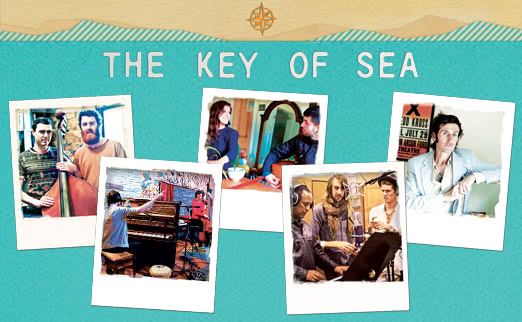Acoustic ballads, jittery Mediterranean folk, smoky melodies, Kurdish traditional instrumentation, frenetic Aghani love songs, gypsy-esque pop-rock, blasted South African jazz, low-key crooning, explosive Afropop…
For a two and a half hour event, The Key Of Sea: Live in Concert had a hell of a lot going for it.
The reason the evening had so much diversity? Its purpose was to celebrate exactly that.
The event was an in-the-flesh incarnation of a compilation CD, the Christmas present-ready The Key of Sea Vol. 2.
The album brings together some of the most polished acts in Australia with a selection of equally impressive musicians who were once asylum seekers.
The result is a thrilling fusion of what’s popular locally, combined with long-standing foreign musical traditions; with proceeds from both the CD and the live event going towards a variety of human rights groups.
Considering the array of cultures clambering for listeners’ attention in such a recording, you’d think it would be near impossible to organise a real-world rendition. But the Key of Sea concert could not have been more professional.
Massive props go to Rockwiz’s Brian Nankervis for his affably charming job at hosting.
A dignified event at a classy venue like Hamer Hall probably shouldn’t be described with phrases like “spontaneous” and “full of surprises,” but with Nankervis chattering behind the mic as each band set up, the breaks were as entertaining as the performances.
Highlights included a riff of silly poetry about a pregnant woman in the audience, and the (genuinely impressive) attempts at rapping by two pairings of Sudanese kids Nankervis befriended before the show.
At the ripe old ages of 13, 12, 9 and 8 respectively, these little rappers were to-die-for adorable, and also extraordinarily capable showmen, especially considering their ages (someone get them a recording contract, quick).
Then there was, of course, the actual planned music.
Opening the show were Greek artists Polyxeni and Tim Rogers, who was looking every inch the silver fox in a dashing grey fedora.
The You Am I frontman’s sublime voice was surprisingly suited to the imposing venue, and perfectly matched to the throaty leaps of Polyxeni’s own Jenny Theologidis.
Beguiling local songstress Sophia Brous paired herself with Kurdish musician Awaz. His traditional quwaal and baglama (traditional Kurdish instruments) formed a spellbinding backdrop to the supernatural heights of Brous’ upper register.
The Tiger and Me’s thickly textured gypsy-pop is challenging enough without throwing an Afghan dambura (a string instrument) into the mix.
It may, however, be exactly what they needed – their partnership with Murtaza Jafari was a warm, organic fusion of earnest world folk.
The lightning-fast strumming of Jafari skimmed the cacophonous base of all six Tiger and Me members playing full-force, in what was an irresistibly energetic collision of styles.
It really depends on the circles you travel in as to which of the next coupling was the bigger drawcard.
South African collective Royal Swazi Spa are a jazz powerhouse, who have shared the stage with artists as illuminated as Ray Charles. But Chet Faker is Chet Faker, Melbourne’s latest collective crush, with the most soulful crooning delivery in Australia today.
Either way, their collaborative performance was a standout: deliciously mellow sax billowed across Faker’s now-famous vocals, alongside shadowy piano refrains, cartwheeling trumpet, and a cheeky wink of double-bass.
Every artist invited to contribute to the performace was more than worthy of the request. But they saved the best for last.
Colourful Sydney five-piece Jinja Safari, provided a firecracker live show, in combination with African refugee Kinfe Geshu’s heartfelt vocal outpourings, and the joyful backing of the SAIL (Sudanese Australian Integrated Learning) children’s choir, which was truly something special.
Every artist, along with the organisers of the event, danced onto the stage, to share in the irresistible positive force of the song (‘Silence of the Guns’) that turned the derogatory phrase “go back to where you come from” on its head.
The sight of some of Australia (and the world’s) finest, all grooving to the infectious rhythms, was a healthy reminder that we have a lot to offer newcomers from countries less fortunate than ours, but they have at least as much – if not more – to offer us.




































